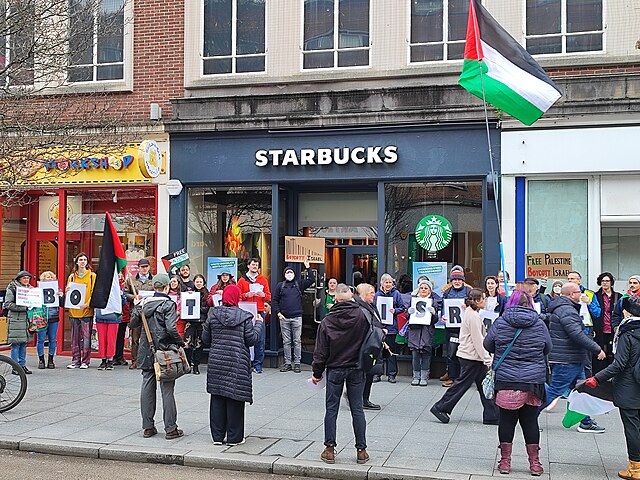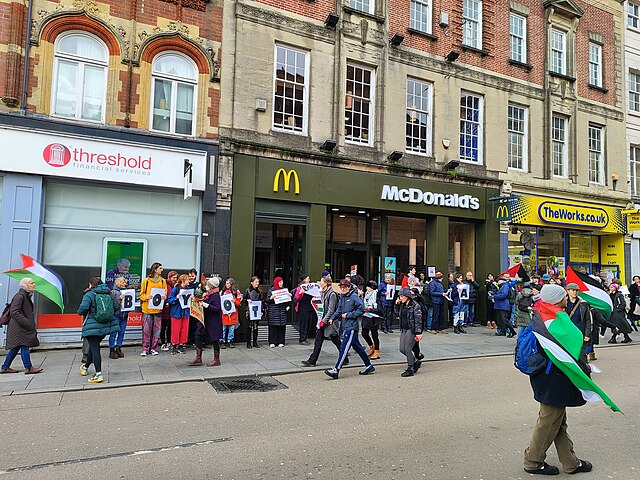
The Impact of Boycotts Against Pro-Israel Businesses

By Mehdi El Merini / Arab America contributing writer
Since the renewed violence in the Israel-Gaza conflict began on October 7, calls for boycotting companies perceived as supporting Israel have intensified globally. The financial consequences for some major corporations have been significant, as activists coordinate consumer boycotts targeting these brands. Notable examples include McDonald’s, Starbucks, and several others, which have experienced notable declines in sales as part of this broader push to influence corporate allegiances on a global scale. People around the world are demonstrating, not just in the streets, but through their wallets as well, against the ongoing genocide being perpetrated against Palestinians in Gaza.
McDonald’s: Declining Sales and Controversial Links to Israel
According to recent financial reports, McDonald’s experienced a 1.5% decline in global same-store sales between July and September. This marks the company’s most substantial contraction in four years and follows a 1% decline in the previous quarter. The decline was especially marked in the UK, France, and China, where consumer spending has slowed, and the political sensitivity of supporting Israel has added pressure.
In April, McDonald’s repurchased its Israeli franchise from local operator Alonyal, which manages 225 McDonald’s locations in Israel. After the October 7 attack by Hamas, Alonyal announced it would donate meals to the Israeli military, sparking backlash among those advocating for Palestinian solidarity. Social media platforms became channels for organizing widespread boycotts of McDonald’s, amplified by influencers who rallied consumers to take action against the brand. In response, McDonald’s launched aggressive promotional campaigns, such as $5 meal deals in the U.S. and £5 deals in the UK, hoping to revive customer interest and counteract declining sales.
Starbucks: Persistent Calls for Boycotts Amid Mixed Reactions
Starbucks has similarly faced boycott calls, especially from Middle Eastern and North African markets, where allegations of pro-Israel support have persisted for years. While Starbucks has denied any official position on the conflict, previous statements by former CEO Howard Schultz expressing support for Israel have fueled activist-driven boycotts. Although Starbucks has not publicly disclosed the financial impact of these boycotts, industry analysts estimate a notable drop in Middle Eastern sales, with some locations reporting a 10% to 15% decline in customer traffic in October alone.
The consumer response to Starbucks highlights the power of boycott movements in mobilizing collective action and influencing brand perception across markets. Despite efforts to distance itself from political controversy, Starbucks has struggled to mitigate the public’s perception of its historical ties with Israel.

Coca-Cola: Dropping Sales Across Target Markets
Coca-Cola, another global brand perceived as pro-Israel, has also been affected by the recent boycotts. Coca-Cola has faced longstanding criticism over its business relations in Israel, and calls for boycotts have spiked in response to the ongoing conflict. Middle Eastern markets have seen a reduction in Coca-Cola’s sales volume, with reports suggesting a decline of approximately 5% in the region in October. This trend has extended to certain consumer bases in Europe, where political solidarity with Palestine has influenced purchasing behavior.
The impact on Coca-Cola reflects the reach of consumer activism as well as the challenges brands face in maintaining consumer loyalty amid controversial international business associations.
The Broader Impact on Companies with Perceived Pro-Israel Ties
In addition to McDonald’s, Starbucks, and Coca-Cola, several other multinational companies have faced calls for boycotts, including Nestlé and Puma. Nestlé, which has maintained manufacturing plants in Israel and faced accusations of supporting the Israeli economy, saw declines in certain markets with strong pro-Palestinian sentiment. Middle Eastern and European consumers drove sales down by 3% for Nestlé in October, as activists linked the brand to Israeli ties and called for boycotts.
Puma, which has been accused by activists of sponsoring Israeli sports teams, has also seen a decline in sales. In key Middle Eastern markets, Puma’s sales dropped by nearly 7% during the initial weeks of the conflict, and the brand has faced mounting public pressure to reconsider its partnerships. The backlash has been fueled by social media campaigns urging consumers to boycott Puma apparel, a strategy mirrored in the campaigns against McDonald’s and Starbucks.

Economic Challenges Compounding the Boycott Impact
The current economic climate, characterized by inflation and cautious consumer spending, has compounded the financial impact of these boycotts. In the United States, consumers have become more frugal amid rising food and energy costs, and the shift toward at-home dining has already affected the restaurant industry. As a result, consumers are making more intentional purchasing choices, allowing boycotts to gain traction in a context where budget-conscious decisions align with moral motivations.
In regions like Europe and the Middle East, where political activism around the ongoing genocide against Palestinians in Gaza is particularly high, the economic downturn has reinforced this trend. Brands such as McDonald’s and Starbucks are now not only competing with other fast-food chains but are also contending with heightened consumer sensitivity to corporate stances on international conflicts.
The Role of Social Media in Amplifying Boycotts
Social media has proven instrumental in fueling these boycotts. Platforms like Twitter, Instagram, and TikTok have allowed activists to share and coordinate boycott campaigns in real-time, amplifying calls for solidarity with Palestine and leveraging influencers to reach millions. Viral hashtags and targeted content have accelerated the spread of boycott information, with several boycott-related posts reaching tens of millions of views. This digital mobilization has given boycott movements a new level of reach and influence, affecting corporate performance on a scale not previously seen.
The sustained pressure on companies like McDonald’s, Starbucks, Coca-Cola, Nestlé, and Puma underscores the power of consumer-driven activism in shaping corporate behavior. As social media allows for global awareness and instant communication, brands are likely to face growing scrutiny over their business practices and associations in politically sensitive regions.
What This Means for Corporate Strategy Going Forward
As these brands navigate the current political and economic challenges, they may need to consider strategies that respond to public sentiment without alienating core markets. For McDonald’s and Starbucks, this could mean revisiting their global franchising and communication policies to address perceived controversies proactively. Coca-Cola and Nestlé, facing declining sales in Middle Eastern and North African markets, might consider adjusting local marketing efforts or enhancing transparency around their operations.
These boycotts mark a critical moment for brands attempting to balance global expansion with corporate social responsibility. As long as consumers continue to prioritize values-aligned spending, companies will face heightened expectations to clarify their positions and consider the reputational risks of their business partnerships.
The recent boycotts against major corporations perceived as supporting Israel illustrate the powerful intersection of consumer activism, social media mobilization, and political conflict. While McDonald’s, Starbucks, Coca-Cola, Nestlé, and Puma grapple with declining sales and public pressure, this situation exemplifies the evolving nature of consumer influence in a globalized and socially conscious economy. Going forward, these brands may need to rethink their approaches to global partnerships and corporate responsibility to navigate an increasingly complex landscape shaped by both economic realities and political sentiment.
Check out our blog here!
Discover more from reviewer4you.com
Subscribe to get the latest posts to your email.




